- Home
- Christopher Paolini
Inheritance i-4 Page 11
Inheritance i-4 Read online
Page 11
Arya held her position at the conclusion of the stroke, her face mere inches from his. Her forehead glistened and her cheeks were flushed.
With exaggerated care, they disengaged.
Eragon straightened his tunic, then squatted next to Arya. His battle rage had burned itself out and left him focused, if not entirely at ease.
“I don’t understand,” he said quietly.
“You have become too accustomed to fighting Galbatorix’s soldiers. They cannot hope to match you, so you take chances that would otherwise prove your undoing. Your attacks are too obvious-you should not rely on brute strength-and you have grown lax in your defense.”
“Will you help me?” he asked. “Will you spar with me when you can?”
She nodded. “Of course. But if I cannot, then go to Blodhgarm for instruction; he is as skilled with a blade as I am. Practice is the only remedy you need, practice with the proper partners.”
Eragon had just opened his mouth to thank her when he felt the presence of a consciousness other than Saphira’s pressing against his mind, vast and frightening and filled with the most profound melancholy: a sadness so great, Eragon’s throat tightened and the colors of the world seemed to lose their luster. And, in a slow, deep voice, as if speaking was a struggle of almost unbearable proportions, the golden dragon Glaedr said:
You must learn … to see what you are looking at.
Then the presence vanished, leaving behind a black void.
Eragon looked at Arya. She appeared as stricken as he was; she had heard Glaedr’s words as well. Beyond her, Blodhgarm and the other elves stirred and murmured, while by the edge of the road, Saphira craned her neck as she tried to look at the saddlebags tied to her back.
They had all heard, Eragon realized.
Together he and Arya rose from the ground and sprinted over to Saphira, who said, He will not answer me; wherever he was, he has returned, and he will not listen to anything but his sorrow. Here, see.…
Eragon joined his mind with hers, and with Arya’s, and the three of them reached out with their thoughts toward Glaedr’s heart of hearts, where it lay hidden within the saddlebags. What remained of the dragon felt more robust than before, but his mind was still closed to outside communication, his consciousness listless and indifferent, as it had been ever since Galbatorix slew his Rider, Oromis.
Eragon, Saphira, and Arya tried to rouse the dragon from his stupor. However, Glaedr steadfastly ignored them, taking no more notice of them than a sleeping cave bear might of a few flies buzzing around his head.
And yet Eragon could not help but think that Glaedr’s indifference was not as complete as it seemed, given his comment.
At last the three of them admitted defeat and withdrew to their respective bodies. As Eragon returned to himself, Arya said, “Perhaps if we could touch his Eldunari …?”
Eragon sheathed Brisingr, then hopped onto Saphira’s right foreleg and pulled himself into the saddle perched on the crest of her shoulders. He twisted round in his seat and began to work on the buckles of the saddlebags.
He had unfastened one of the buckles and was picking at the other when the brazen call of a horn rang forth from the head of the Varden, sounding the advance. At the signal, the vast train of men and animals lurched forward, their movements hesitant at first, but becoming smoother and more confident with every step.
Eragon glanced down at Arya, torn. She solved his dilemma by waving and saying, “Tonight, we will speak tonight. Go! Fly with the wind!”
He quickly rebuckled the saddlebag, then slid his legs through the rows of straps on either side of the saddle and pulled them tight, so he would not fall off Saphira in midair.
Then Saphira crouched and, with a roar of joy, leaped out over the road. The men below her ducked and cringed, and horses bolted as she unfurled her huge wings and flapped, driving herself away from the hard, unfriendly ground, up into the smooth expanse of the sky.
Eragon closed his eyes and tilted his face up, glad to finally be leaving Belatona. After spending a week in the city with nothing to do but eat and rest-for so Nasuada had insisted-he was eager to resume their journey toward Uru’baen.
When Saphira leveled off, hundreds of feet above the peaks and towers of the city, he said, Will Glaedr recover, do you think?
He will never be as he was.
No, but I hope that he will find a way to overcome his grief. I need his help, Saphira. There are so many things I still don’t know. Without him, I have no one else to ask.
She was silent for a while, the only sound that of her wings. We cannot hurry him, she said. He has been hurt in the worst way a dragon or Rider can be. Before he can help you, me, or anyone else, he must decide that he wants to continue living. Until he does, our words cannot reach him.
NO HONOR, NO GLORY,
ONLY BLISTERS IN
UNFORTUNATE PLACES
The belling of the hounds grew louder behind them, the pack of dogs howling for blood.
Roran tightened his grip on the reins and bent lower over the neck of his galloping charger. The pounding of the horse’s hooves rolled through him like thunder.
He and his five men-Carn, Mandel, Baldor, Delwin, and Hamund-had stolen fresh horses from the stable of a manor house less than a half mile away. The grooms had not taken kindly to the theft. A show of swords had been sufficient to overcome their objections, but the grooms must have alerted the manor guards as soon as Roran and his companions had departed, for ten of the guards had set out after them, led by a pack of hunting dogs.
“There!” he shouted, and pointed toward a narrow strip of birch trees that extended from between two nearby hills, no doubt following the path of a stream.
At his word, the men pulled their horses off the well-traveled road and headed in the direction of the trees. The rough ground forced them to slow their headlong pace, but only slightly, despite the risk that the horses would step in a hole and break a leg or throw a rider. Dangerous as it was, allowing the hounds to catch them would be more dangerous still.
Roran dug his spurs into the sides of the horse and shouted “Yah!” as loudly as he could through his dust-clogged throat. The gelding leaped forward and, stride by stride, began to gain on Carn.
Roran knew that his horse would soon reach a point where it could no longer produce such bursts of speed, no matter how hard he jabbed it with his spurs or whipped it with the ends of his reins. He hated to be cruel, and he had no desire to ride the animal to death, but he would not spare the horse if it meant the failure of their mission.
As he drew level with Carn, Roran shouted, “Can’t you hide our trail with a spell?”
“Don’t know how!” Carn replied, barely audible over the rush of wind and the sound of the galloping horses. “It’s too complicated!”
Roran swore and glanced over his shoulder. The hounds were rounding the last bend in the road. They seemed to fly over the ground, their long, lean bodies lengthening and contracting at a violent rate. Even at that distance, Roran could make out the red of their tongues, and he fancied he saw a gleam of white fangs.
When they reached the trees, Roran turned and began to ride back into the hills, staying as close as he could to the line of birches without hitting low-hanging branches or fallen logs. The others did likewise, shouting at their horses to keep them from slowing as they raced up the incline.
To his right, Roran glimpsed Mandel hunched over his speckled mare, a feral snarl on his face. The younger man had impressed Roran with his stamina and fortitude over the past three days. Ever since Katrina’s father, Sloan, had betrayed the villagers of Carvahall and killed Mandel’s father, Byrd, Mandel had seemed desperate to prove himself the equal of any man in the village; he had acquitted himself with honor in the last two battles between the Varden and the Empire.
A thick branch hurtled toward Roran’s head. He ducked, hearing and feeling the tips of dry twigs snapping against the top of his helm. A torn leaf tumbled down his face and covered
his right eye for a moment; then the wind snatched it away.
The gelding’s breathing became increasingly labored as they followed the rift deeper into the hills. Roran peeked under his arm and saw that the pack of hounds was less than a quarter mile away. Another few minutes, and they would surely overtake the horses.
Blast it, he thought. He raked his gaze back and forth across the densely packed trees to his left and the grassy hill to his right, searching for something-anything-that could help them lose their pursuers.
He was so fuzzy-headed from exhaustion, he almost missed it.
Twenty yards ahead of him, a crooked deer trail ran down the side of the hill, crossed his path, then disappeared into the trees.
“Whoa! … Whoa!” Roran shouted, leaning back in his stirrups and hauling on the reins. The gelding slowed to a trot, though it snorted with protest and tossed its head, trying to get the bit between its teeth. “Oh no you don’t,” Roran growled, and tugged on the reins even harder.
“Hurry!” he called to the rest of the group as he turned his horse and entered the thicket. The air was cool under the trees, almost chilly, which was a welcome relief, hot as he was from his exertion. He only had a moment to savor the sensation before the gelding pitched forward and began to stumble down the side of the bank toward the stream below. Dead leaves crackled under its iron-shod hooves. In order not to fall over the horse’s neck and head, Roran had to lie almost flat against its back, his legs stuck out straight in front of him, knees locked.
When they reached the bottom of the gorge, the gelding clattered across the stony creek, splashing wings of water as high as Roran’s knees. Roran paused at the far side to see whether the others were still with him. They were, riding nose to tail, down through the trees.
Above them, where they had entered the thicket, he could hear the yapping of the dogs.
We’re going to have to turn and fight, he realized.
He swore again and spurred the gelding away from the stream, climbing the soft, moss-covered bank as he continued along the faintly marked trail.
Not far from the stream was a wall of ferns, and beyond that, a hollow. Roran spotted a fallen tree that he thought might serve as a makeshift barrier if it could be dragged into place.
I just hope they don’t have bows, he thought.
He waved at his men. “Here!”
With a slap of the reins, he drove the gelding through the bracken and into the hollow, then slid out of the saddle, though he kept a tight hold on it. As his feet struck the ground, his legs gave out beneath him, and he would have fallen if not for the support. He grimaced and pressed his forehead against the shoulder of the horse, panting as he waited for the tremors in his legs to subside.
The rest of the group crowded around him, filling the air with the stink of sweat and the jingle of harnesses. The horses shuddered, their chests heaving, and yellow foam dripped from the corners of their mouths.
“Help me,” he said to Baldor, and motioned at the fallen tree. They fit their hands under the thick end of the log and heaved it off the ground. Roran gritted his teeth as his back and thighs screamed with pain. Riding at full gallop for three days-combined with less than three hours of sleep for every twelve spent in the saddle-had left him frighteningly weak.
I might as well be going into battle drunk, sick, and beaten half out of my senses, Roran realized as he let go of the log and straightened upright. The thought unnerved him.
The six men positioned themselves in front of the horses, facing the trampled wall of ferns, and drew their weapons. Outside the hollow, the hunting cries of the hounds sounded louder than ever, their overeager yelps echoing off the trees in a raucous din.
Roran tensed and lifted his hammer higher. Then, interspersed with the barking of the dogs, he heard the strange, lilting melody of the ancient language emanating from Carn, and the power contained within the phrases caused the back of Roran’s neck to prickle with alarm. The spellcaster uttered several lines in a short, breathless manner, speaking so quickly, the words melded together into an indistinct babble. As soon as he finished, he gestured at Roran and the others and said in a strained whisper, “Get down!”
Without question, Roran dropped to his haunches. Not for the first time, he cursed the fact that he was unable to use magic himself. Of all the skills a warrior could possess, none was more useful; lacking it left him at the mercy of those who could reshape the world with nothing more than their will and a word.
The ferns in front of him rustled and shook; then a hound pushed its black-tipped snout through the foliage and peered at the hollow, nose twitching. Delwin hissed and raised his sword, as if to behead the dog, but Carn made an urgent noise in his throat and waved at him until he lowered his blade.
The dog furrowed its brow, appearing puzzled. It scented the air again, then licked its jowls with its engorged, purplish tongue, and withdrew.
As the fronds sprang back over the dog’s face, Roran slowly released the breath he had been holding. He looked at Carn and raised an eyebrow, hoping for an explanation, but Carn just shook his head and placed a finger over his lips.
A few seconds later, two more dogs wiggled their way through the undergrowth to inspect the hollow; then, like the first one, they backed out after a short while. Soon the pack began to whine and yip as they cast about among the trees, trying to figure out where their prey had gone.
As he sat waiting, Roran noticed that his leggings were mottled with several dark blotches along the inside of his thighs. He touched one of the discolored areas, and his fingers came away with a film of bloody liquid. Each blotch marked the location of a blister. Nor were they his only ones; he could feel blisters on his hands-where the reins had chafed the web of skin between his thumbs and forefingers-and on his heels, and in other, more uncomfortable places.
With an expression of distaste, he wiped his fingers against the ground. He looked at his men, at how they crouched and knelt, and he saw the discomfort on their faces whenever they moved and the slightly twisted grips with which they held their weapons. They were in no better condition than he was.
Roran decided that when they next stopped to sleep he would have Carn heal their sores. If the magician seemed too tired, however, Roran would refrain from having his own blisters healed; he would rather endure the pain than allow Carn to expend all of his strength before they arrived at Aroughs, for Roran suspected that Carn’s skills might very well prove useful in capturing the city.
Thinking of Aroughs and of the siege he was somehow supposed to win caused Roran to press his free hand against his breast to check that the packet containing the orders he could not read and the commission he doubted he would be able to keep were still safely tucked in his tunic. They were.
After several long, tense minutes, one of the hounds began to bark excitedly somewhere in the trees upstream. The other dogs rushed in that direction and resumed the deep-chested baying that meant they were in close pursuit of their quarry.
When the clamor had receded, Roran slowly rose to his full height and swept his gaze over the trees and bushes. “All clear,” he said, keeping his voice subdued.
As the others stood, Hamund-who was tall and shaggy-haired and had deep lines next to his mouth, although he was only a year older than Roran-turned on Carn, scowling, and said, “Why couldn’t you have done that before, instead of letting us go riding willy-nilly over the countryside and almost breaking our necks coming down that hill?” He motioned back toward the stream.
Carn responded with an equally angry tone: “Because I hadn’t thought of it yet, that’s why. Given that I just saved you the inconvenience of having a host of small holes poked in your hide, I would think you might show a bit of gratitude.”
“Is that so? Well, I think that you ought to spend more time working on your spells before we’re chased halfway to who-knows-where and-”
Fearing that their argument could turn dangerous, Roran stepped between them. “Enough,” he said. Then h
e asked Carn, “Will your spell hide us from the guards?”
Carn shook his head. “Men are harder to fool than dogs.” He cast a disparaging look at Hamund. “Most of them, at least. I can hide us, but I can’t hide our trail.” And he indicated the crushed and broken ferns, as well as the hoofprints gouged into the damp soil. “They’ll know we’re here. If we leave before they catch sight of us, the dogs will draw them off and we’ll-”
“Mount up!” Roran ordered.
With an assortment of half-muttered curses and poorly concealed groans, the men climbed back onto their steeds. Roran glanced over the hollow one last time to make sure that they had not forgotten anything, then guided his charger to the head of the group and tapped the horse with his spurs.
And together they galloped out from under the shadow of the trees and away from the ravine as they resumed their seemingly never-ending journey to Aroughs. What he would do once they reached the city, though, Roran had not the slightest idea.
MOONEATER
Eragon rolled his shoulders as he walked through the Varden’s camp, trying to work out the kink in his neck that he had acquired while sparring with Arya and Blodhgarm earlier that afternoon.
As he topped a small hill, which stood like a lone island amid the sea of tents, he rested his hands on his hips and paused to take in the view. Before him lay the dark spread of Leona Lake, gleaming in the twilight as the crests of the shallow waves reflected the orange torchlight from the camp. The road the Varden had been following lay between the tents and the shore: a broad strip of paving stones set with mortar that had been constructed, or so Jeod had informed him, long before Galbatorix had overthrown the Riders. A quarter mile to the north, a small, squat fishing village sat close against the water; Eragon knew its inhabitants were far from happy that an army was camped on their doorstep.

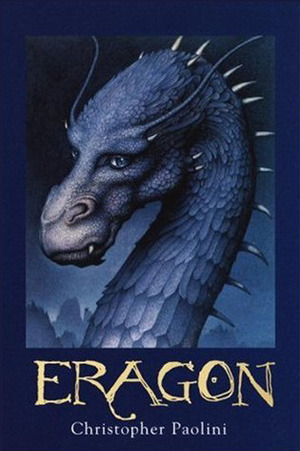 Eragon
Eragon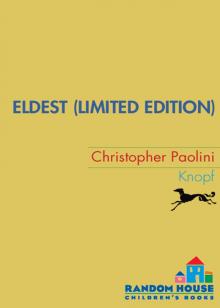 Eldest
Eldest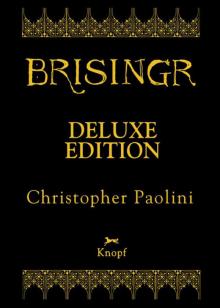 Brisingr
Brisingr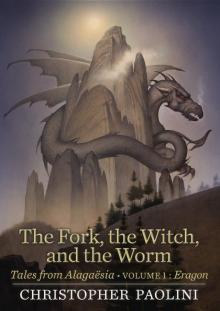 The Fork, the Witch, and the Worm
The Fork, the Witch, and the Worm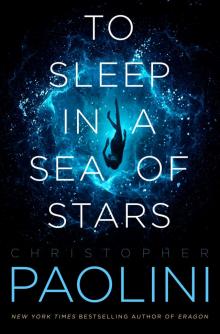 To Sleep in a Sea of Stars
To Sleep in a Sea of Stars![Eldest [en] i-2 Read online](http://i1.bookreadfree.com/i/03/19/eldest_en_i-2_preview.jpg) Eldest [en] i-2
Eldest [en] i-2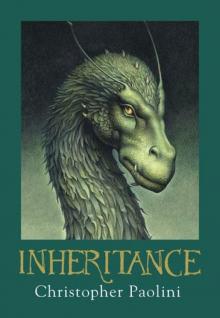 Inheritance i-4
Inheritance i-4![Brisingr [en] i-3 Read online](http://i1.bookreadfree.com/i1/03/31/brisingr_en_i-3_preview.jpg) Brisingr [en] i-3
Brisingr [en] i-3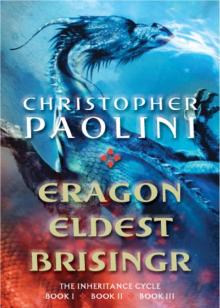 Inheritance Cycle Omnibus
Inheritance Cycle Omnibus